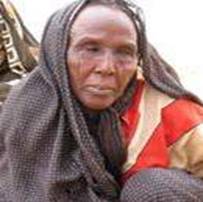|
|
Life Gets Harder, as Violence Increases in Darfur
By Raymond Thibodeaux and Shiga Karo, VOANew. com
August 22, 2004

Photo by VOANew.com
Darfur, Sudan -- Hundreds of villages in the Darfur region of western
Sudan have been abandoned after a year and a half of attacks by Arab
militias, known as the janjaweed, which have driven off the black Africans
who make up the majority of Darfur's six million people.
Shiga Karo, a village about 80 miles east of the Chad-Sudan border, is now
virtually deserted. Before Sudanese air force planes bombed it repeatedly
in February and March, it was one of northern
Darfur
's few symbols of stable prosperity. It had a clean and seemingly
limitless supply of groundwater, thousands of goats, cattle and camels, a
bustling market and huge farms of millet and sorghum, surrounded by rocky
hills to hold back the encroaching desert.
Today, blast craters and the remains of unexploded bombs line the village.
The bombings paved the way for the janjaweed militias to swoop in and
ransack the village, looting the safes in the market, the stores of grain,
and hundreds of goats, cattle and camels, which represent the life savings
of most of the villagers.
"This is what the Sudanese government doesn't want you to see,"
says Bahar Ibrahim, who serves on the advisory council for the Sudanese
Liberation Army, or
SLA
, the region's main rebel group. The
SLA
is composed mainly of ethnic Zaghawans, one of the black African tribes
targeted by the janjaweed.
But Mr. Ibrahim says it was not the janjaweed who left this devastation.
He says, "It was the government, bombing civilians."
Analysts say
Sudan
's Arab Islamist government armed and supported the janjaweed, ostensibly
to put down a 2003 uprising by
SLA
rebels resentful of a government that for years usurped the meager wealth
of the
Darfur
region, while marginalizing the black Africans who produced it.
The rebels say they are fighting for more political power and a fair share
of
Sudan
's $1 million-a-day oil revenue.
Extremists within the
SLA
go further, saying they want regime change in
Khartoum
itself.
The rebels say the janjaweed are equipped by
Sudan
as a proxy army to help crush the rebellion. And, the rebels say, they
rarely choose targets where they are likely to encounter rebel forces.
Instead, the rebels say, they have focused their attacks on unarmed
civilians, with the aim of driving them off the land.
Suliman Hassid, the 87-year-old chief of Shiga Karo,
blames Sudanese President Omar el-Bashir for emboldening Arab nomads and
escalating long-standing tensions between them and the country's black
African tribes.
"Traditionally, this sort of conflict happened between the Arab
tribes and the black tribes, maybe because of pasture, because of farms,
because of water sources or wells," he said.
"Traditionally, we used to solve these problems. But this time
around, since the advent of Bashir's regime, these things have changed.
Bashir has given them money, he has given them arms and given them sort of
license to go and own the land, and drive away these people, who are maybe
seen as obstacles to their hopes and dreams."
In a rocky ravine on a hill less than an hour's walk from the
village
of
Furawiyah
- not far from Shiga Karo, at least 12 bodies lay rotting in the scorching
sun. The backs of the skulls of some are shattered. Villagers identified
them by their clothing and some of the leather ornaments they were wearing
as ethnic Zaghawans, mostly in their 20s and 30s.
Sixty-eight-year-old Hassan Azadin says, in his
words, "government soldiers brought these men here and shot them. We
can't bury them yet, because we don't know their names." Mr. Azadin
lived in Soboli-Gorbo, one of several villages near Furawiyah that the
janjaweed has attacked repeatedly since March.
Mr. Azadin said the bodies weren't discovered until early July, but by
then, they were too decomposed for family members to recognize them.
Within the rebel-held areas of western
Sudan
, hundreds-of-thousands of Sudanese hide in tattered shelters in
Darfur
's boulder-strewn mountains, venturing from their hideouts to scavenge
groundnuts and what few grains they can glean from abandoned farms.
Meanwhile, with the approach of the rainy season and the promise of
drinkable water along the way for themselves and their livestock, many
Sudanese are leaving their hiding places for the relative safety of the
refugee camps over the border in
Chad
.
Waiting at the camps are aid groups that are struggling to house and feed
the nearly 200,000 Sudanese who are already there.
|
|



